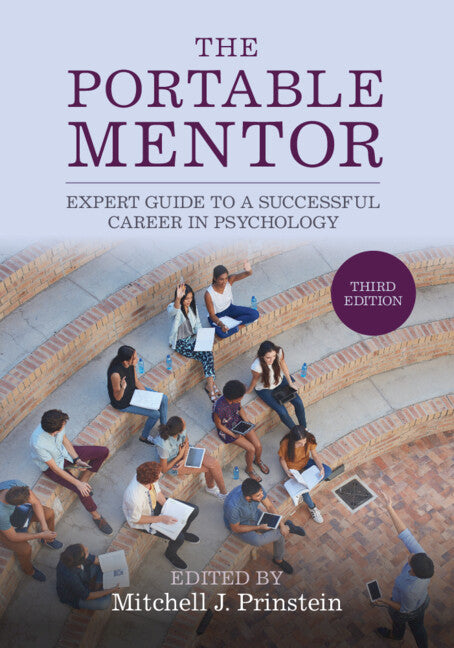Freshly Printed - allow 8 days lead
Couldn't load pickup availability
The Portable Mentor
Expert Guide to a Successful Career in Psychology
A one-stop resource for practical, concrete, and honest advice in professional development and how to pursue a career in psychology.
Mitchell J. Prinstein (Edited by)
9781108794381, Cambridge University Press
Paperback / softback, published 4 August 2022
450 pages
25.7 x 17.7 x 3.2 cm, 1.2 kg
'As someone who would never have pursued a career in psychology without the guidance of mentors, I am grateful to Mitch Prinstein for the essential guidance in the third edition of The Portable Mentor. Comprehensive, clear, and engaging, this book offers advice and support to individuals, beginning with when one is first considering graduate training in psychology to one's career in various roles of psychologists. The contributors present diverse perspectives and lived experiences. This edited volume is clearly a work reflecting each of the contributor's dedication to mentoring. Do young people a favor by recommending this book to them.' Sherryl H. Goodman, Samuel Candler Dobbs Professor of Psychology and Director of Graduate Studies, Emory University, USA
Psychology is a popular subject to study, with thousands entering graduate school each year, but unlike med or pre-law, there is limited information available to help students learn about the field, how to successfully apply, and how to thrive while completing doctoral work. The Portable Mentor is a useful, must-have resource for all students interested in psychology. This third edition is updated and expanded, designed to address students' and trainees' need for open dialogue and mentorship. Throughout, it covers some of the common challenges graduates face and features discussions about how to celebrate your identity and find a rewarding, worthwhile career path. It comprises thirty chapters written by more than seventy of the field's top experts, successfully filling a void in professional development advice.
Preface
Part I. Applying to Graduate School: 1. Before you apply to graduate programs in psychology: Knowing when you're ready, and gaining post-baccalaureate experiences Casey D. Calhoun and Mitchell J. Prinstein
2. Deciding to apply and successfully gaining admission to graduate schools in psychology Mitchell J. Prinstein
Part II. Beginning Your Career: 3. Your first year in graduate school Mitchell J. Prinstein, Kara A. Fox, Nathan H. Field and Olivia H. Pollak
4. Taking the scientific path: A road map for psychology students Steven C. Hayes and Nicolas M. Berens
5. Impostor syndrome in graduate school Donte Bernard and Steven Stone-Sabali
6. Cultural humility in psychology Maysa Akbar
7. Graduate training for students of color: Belonging required
fitting in, not recommended Keyona Allen, Amanda Parks and Shawn C. T. Jones
8. Navigating graduate school in psychology as a sexual and/or gender minority (lgbtq+) student Leigh A. Spivey-Rita and Ilana S. Berman
9. Considerations for first generation students in psychology Casey D. Calhoun, Donte L. Bernard, Luis D. Medina, Evelyn Behar, April R. Smith, Adam Bryant Miller, Angelica M. Diaz-Martinez, Angela Scarpa, Matthew K. Nock, and Mitchell J. Prinstein 10. Developing and practicing ethics Kenneth S. Pope, Nayeli Y. Chavez-Dueñas, and Hector Y. Adames
Part III. Your Research/Academic Career: 11. An open science workflow for more credible, rigorous research Katherine S. Corker
12. Presenting your research Lindsey L. Cohen , Sarah Martin and Abigail Robbertz
13. Publishing your research Alan E. Kazdin
14. Recommendations for teaching psychology William Rando and Leonid Rozenblit
15. Applying for NIH grants Carl W. Lejuez, Elizabeth K. Reynolds, Will M. Aklin and B. Christopher Frueh
16. On being a woman in academic psychology Kristen Lindquist, Eliza Bliss-Moreau, June Gruber and Jane Mendle
Part IV. Your Career as a Practitioner: 17. Training to begin a private practice Jeffrey E. Barnett and Elizabeth Henshaw Musewicz
18. Obtaining a license to practice psychology Corey J. Habben and Jared W. Bollinger
19. Becoming a specialist: Board certification David R. Cox
20. Becoming a competent and ethical clinical supervisor Erica H. Wise and Ellen E. Fitzsimmons-Craft
Part V. Your Professional Service Career: 21. Getting involved in professional associations: A gateway to career advancement Daniel Dodgen and Carol Williams-Nickelson
22. Advocacy: Advancing psychology and public wellbeing Christopher Loftis
23. Public education of psychology: An Interview with Philip G. Zimbardo, Ph.D. Phil Zimbardo
24. Working with the media – and getting the media to work for you Kim I. Mills
Part VI. Your Career After Graduate School: 25. Recommendations for navigating the postdoctoral fellowship process Amy Sato, Valerie A. Simon, Elissa Jelalian and Anthony Spirito
26. Contemporary employment in psychology and future trends Karen E. Stamm, Jessica C. Conroy, Luona Lin and Amrita C. Ghaness
27. Career possibilities with your doctorate in psychology: Stories from inspiring leaders Antonio Morgan Lopez, Brett Major, Katie Rosanbalm, Muniya Khanna, Ilyse Dobrow DiMarco and Karen Gavin-Evans
28. Professional women in psychology: Integrating your values into a full life Vicki DiLillo, Le Ondra Clark Harvey, Andrea Hussong, Barbara Kamholz, Elizabeth Lloyd-Richardson and Monica Rivers
29. The academic job search Robert J. Sternberg
30. Balancing career and family Paula J. Caplan.
Subject Areas: Clinical psychology [MMJ], Psychiatry [MMH], Health psychology [MBNH9]


